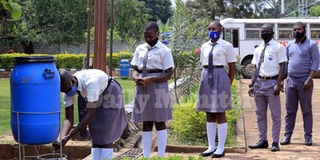Make lessons accessible to special needs learners

Students wash hands after break time at Kisubi Mapeera Senior Secondary School in Entebbe on October 12, 2020, during the Covid-19 pandemic. PHOTO/DAVID LUBOWA
What you need to know:
- The issue: Learning
- Our view: The needs of learners with special needs should be met in the best way possible by working with local leaders and schools of the disabled to identify learners who have been left out.
Following the 42-day lockdown instituted to stop the rapid spread of Covid-19, schools and all learning institutions were closed and learners sent back home.
To ensure continuity of learning, last week, radio lessons for middle grades of primary schools resumed.
According to a statement from the Ministry of Education, the lessons would be aired for Primary Four and Primary Five classes through 15 radio stations, and the date for other grades would be communicated.
Unfortunately, some students with disability, especially the deaf might be left out unless the necessary equipment and lesson formats are provided.
In our story of June 25 titled, “Deaf learners miss out on radio classes”, a number of parents whose children have hearing impairments in Acholi Sub-region seem to be stuck on how to help their children benefit from these radio lessons.
Mr Richard Olanya, a father of a 17-year-old pupil in Primary Six at Laroo Deaf-inclusive School in Gulu District, is quoted saying he cannot assist his son with studies because he lacks sign language skills.
The story also quotes Mr Patrick Ojok, the coordinator of Gulu Disabled Persons’ Union, who points out that blind students might be left behind when it comes to printed material saying the speech software that the blind use is unaffordable for many parents with such children.
This is not to paint a grim picture but there are real gaps that need to be filled in these learning programmes if all students are to benefit.
Fortunately, the ministry seems to have made some headway in procuring and distributing equipment needed.
According to Mr Patrick Muinda, the ministry’s spokesperson, equipment to help disabled learners such as victor screen readers, braille and MP3 players with corresponding SD cards for those who cannot see or hear and victor readers for those who need to hear the instructions were taken to the inclusive schools in Kibaale, Hoima, Kagadi, Masindi and some schools in northern Uganda.
The problem now is, what about those who missed out during these distributions? When will they be catered to?
Sustainable Development Goal four is about ensuring inclusive and equitable quality education and promoting lifelong learning opportunities for all. For this to be satisfactorily achieved, much has to be taken into account.
The needs of learners with special needs should be met in the best way possible by working with local leaders and schools of the disabled to identify learners who have been left out. Let’s make education accessible to all learners.




